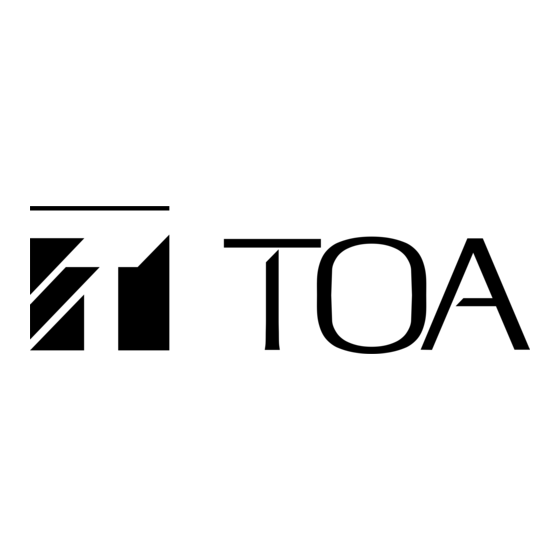

Toa IC-100 Programmer's Manual
Remote control and monitoring programmer's guide
Hide thumbs
Also See for IC-100:
- Installation handbook (64 pages) ,
- Specifications (6 pages) ,
- Supplementary manual (2 pages)
Advertisement
Quick Links
Advertisement

Summary of Contents for Toa IC-100
- Page 1 TOA IC-100 Institutional Intercom Remote Control and Monitoring Programmer's Guide...
- Page 3 2. Integrators using a microprocessor-based product (usually a PC or PLC) as their integrated system's control center, often prefer direct control and monitoring of IC-100 control station activity through the IC-100's integral serial port. Using Remote Control and Monitoring eliminates the need for installing DI-100s and DI-110s and elevates the programmer's level of control.
- Page 4 Data Communicating Equipment (DCE, typical for modems), you will not need the null-modem adapter. Jumper J1 on the MU-110 CPU Card sets the IC-100 serial communication baud rate. TOA ships the MU-110 with jumper J1 in position 4, yielding 1200 bps. You may increase the baud rate to 2400 bps by moving jumper J1 to position 3.
- Page 5 This document describes several types of command messages you can use for controlling and monitoring IC-100 activity. You will find a separate document section for each command message type. Each command message section includes a brief explanation, followed by a table detailing the contents of the fields associated with that message type.
- Page 6 Using the Remote Dial Command Using the IC-100 Remote Dial Command, you can remotely perform any action normally taken by IC-100 sub-station or control station users. The command you send to the IC-100 identifies the line number of the station for which you want to dial and the digits you want dialed.
- Page 7 Monitoring Control Station Activity Using IC-100 remote monitoring, you can request a copy of all information transmitted to the control stations in the exchange to which you are connected. Once the IC-100 accepts your request, it sends you the information control stations use for updating their LCD screens as well as the information DI-100s use for updating DI-110 LED and Relay outputs.
- Page 8 The IC-100 embeds DI-100 call LED messages within the control station display data stream. The IC-100 transmits one of these 12 byte messages with each control station call queue change. The table below details their contents. For a complete listing of all control station display data types, Appendix A Control Station Display Data <STX><COMMAND><ADDRESS><TYPE><STATE><STATION NUMBER><CHECKSUM><ETX>...
-
Page 9: Appendix A - Control Station Display Data
DI Switch and Station Numbers DI Digits in Station Number Left justified ASCII string 32H ( ) 33H ( ) 34H ( ) IC-100 Programmer's Guide — revised September 1999 Switch Number Station Number First Switch Number First Station Number... -
Page 10: Appendix B - Extended Ascii Character Codes
01111010 122 00111011 01111011 123 00111100 01111100 124 00111101 01111101 125 00111110 01111110 126 00111111 01111111 127 IC-100 Programmer's Guide — revised September 1999 Char Binary 10000000 128 10000001 129 10000010 130 10000011 131 10000100 132 10000101 133 10000110 134...








Need help?
Do you have a question about the IC-100 and is the answer not in the manual?
Questions and answers